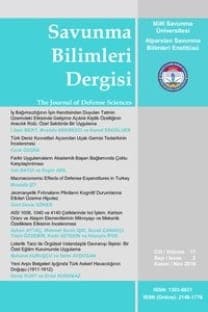AISI 1008 1040 ve 4140 Çeliklerinde Isıl İşlem, Karbon Oranı ve Alaşım Elementlerinin Mikroyapı ve Mekanik Özelliklere Etkisinin İncelenmesi
Bilindiği üzere endüstride kullanılan metal malzemelerin büyük bir bölümünü çelikler oluşturmaktadır. Çelik malzemelerin yoğun kullanılmasının başlıca sebepleri arasında bol miktarda olmaları, ekonomik olarak şekillendirilmeleri ve çok geniş ölçüde mekanik özellik sunabilmeleri yer almaktadır. Çeliklerin temel alaşım elementi karbon (C) olup içerisindeki bileşimine bağlı olarak farklı özellikler gösterirler. Ayrıca, alaşım elementleri de çeliğin mikroyapısında farklılık yaratarak çekme mukavemeti, akma sınırı, darbe dayanımı, süneklik ve işlenebilirlik gibi bir takım mekanik özelliklerini önemli ölçüde etkilemektedir. Bu çalışmada AISI 1008 ve 1040 çelikleri arasında karbon oranının, AISI 1040 ve 4140 çelikleri arasında da bazı alaşım elementlerinin mikroyapı ve mekanik özellikleri nasıl etkilediği deneysel olarak incelenmiştir. İnceleme sürecinde üç farlı çelik türünden; çekme testi, mikrosertlik testi ve ışık metal mikroskobunda mikroyapı görüntüleme için stok haldeki çeliklerden herhangi bir ısıl işlem yapılmadan numuneler hazırlanmıştır. Çekme testinde ısıl işlemin etkisini görmek amacıyla da ilave numuneler hazırlanmıştır. Hazırlanan numunelere yük kontrollü çekme testi, mikroVickers sertlik testi ve mikroyapı görüntüleme işlemleri gerçekleştirilmiştir. Sonuç olarak; hem karbon oranının hem de alaşım elementlerinin etkisi ile akma ve çekme dayanımının arttığı, % uzama ve % kesit daralması değerlerinin düştüğü görülmüştür. Karbon oranı, çekme dayanımında ve % kesit daralmasında daha etkili iken, alaşım elementleri, akma dayanımı ve % uzama üzerinde daha etkili olduğu tespit edilmiştir.
Investigation of Microstructure and Mechanical Properties of Heat Treatment, Carbon Ratio and Alloying Elements in AISI 1008, 1040 and 4140 Steels
Most of the metal materials used in the industry are made of steel. Among the main reasons for the common use of steel materials are abundance, economical shaping and a wide range of mechanical properties. The basic alloy element of the steels is carbon (C) and shows different properties depending on its composition. In addition, alloying elements significantly affect a number of mechanical properties such as tensile strength, yield strength, impact strength, ductility and machinability by making a difference in the microstructure of the steel. In this study, the effect of carbon ratio between AISI 1008 and 1040 steel and some alloying elements between AISI 1040 and 4140 steels were investigated experimentally. During the analysis process, three different types of steel; specimens were prepared without any heat treatment of the stock steels for tensile testing, microhardness test and microstructural imaging of the light metal microscope. Samples were also prepared in order to see the effect of heat treatment in the tensile test. Load-controlled tensile test, microVickers hardness test and microstructure imaging were performed for the prepared samples. As a result; both the carbon ratio and the effect of the alloying elements increase the yield and tensile strength, and the % elongation and % section shrinkage values decrease. Carbon ratio is more effective in tensile strength and % shrinkage, while alloying elements are more effective in yield strength and % elongation.
Keywords:
AISI 1008, AISI 1040, AISI 4140, Microstructure, Internal Structure,
___
- Kaynakça
- Kitaplar
- Avner, S.H. (1986) Introduction to Physical Metallurgy, McGraw Hill Book Company, 2.ed., New York, 315-336. Callister, W. D., & Rethwisch, D. G. (2008) Fundamentals of materials science and engineering: An integrated approach. Hoboken, NJ: John Wiley & Sons. Krauss, George & Grossmann, M. A. (Marcus Aurelius), (1980) Principles of heat treatment of steel. American Society for Metals, Metals Park, Ohio. Lorusso, H., (2009) Soldadura de aceros dual phase en chapa fina: obtención, procesos, microestructuras y propiedades mecánicas. Universidad de Buenos Aires. Parrish, Geoffrey (1980) The influence of microstructure on the properties of case- carburized components. American Society for Metals, Metals Park, Ohio. Thelning, K-E., (1984) Steel and Its Heat Treatment (2nd Ed.), Butterworths, London, UK., 45-93.
- Makaleler
- Choo, Seong-Hun & Lee, Sunghak & Golkovsky, M.G.. (2000). Effects of accelerated electron beam irradiation on surface hardening and fatigue properties in an AISI 4140 steel used for automotive crankshaft. Materials Science and Engineering A-structural Materials Properties Microstructure and Processing - MATER SCI ENG A-STRUCT MATER. 293:56-70. https://doi.org/10.1016/S0921-5093(00)01207-7. Maffei, B., Salvatore, W., Valentini, R., (2007) Dual-phase steels rebars for high- ductile r.c. structures, part I: microstructural and mechanical characterization of steel rebars. Engineering Structures Vol. 29: 3325- 3332. Svoboda; H., Lorusso, H.N., Burgueño, A., (2011) Soldadura de aceros Dual Phase en chapa fina: GMAW, PAW y RSW Soldag. insp. São Paulo, Vol.16, No. 2, p.165-176. Valeria L. de la Concepcióna , Hernán N. Lorussoa,b, Hernán G. Svobodab,c (2015) Effect of carbon content on microstructure and mechanical properties of dual phase steels, Procedia Materials Science 8: 1047–1056 https://doi.org/10.1016/j.mspro.2015.04.167
- Web Siteleri
- Çeliğe Alaşım Elementlerinin Etkileri. 13 Mart 2018’de http://www.atacelik.com/etkileri.htm adresinden erişim sağlanmıştır. Material Property Datai. 15 Mart 2018’de, 05 Ekim 2018’de (https://www.erdemir.com.tr/Sites/1/upload/files/web.tr-2500.pdf) adresinden erişim sağlanmıştır.
- ISSN: 1303-6831
- Yayın Aralığı: Yılda 2 Sayı
- Başlangıç: 2002
- Yayıncı: Milli Savunma Üniversitesi Alparslan Savunma Bilimleri ve Millî Güvenlik Enstitüsü
Sayıdaki Diğer Makaleler
Ayhan AYTAÇ, Mehmet Samir IŞIK, Burak ÇANAKÇI, Tekin ÖZDEMİR, Kadir AZTEKİN, Hüseyin İPEK
Yeni Arşiv Belgeleri Işığında Türk Askerî Havacılığının Doğuşu (1911-1912)
İ.sani MERT, Mustafa BEKMEZCİ, Kemal EROĞLUER
Türk Deniz Kuvvetleri Açısından Uçak Gemisi Tedarikinin İncelenmesi
Türkiye’de Savunma Harcamalarının Makro Ekonomik Etkileri
Jeomanyetik Fırtınaların Pilotların Kognitif Durumlarına Etkileri Üzerine Hipotez
Farklı Uygulamaların Akademik Başarı Bağlamında Çoklu Karşılaştırılması
Liderlik Tarzı ile Örgütsel Vatandaşlık Davranışı İlişkisi: Bir Özel Eğitim Kurumunda Uygulama
